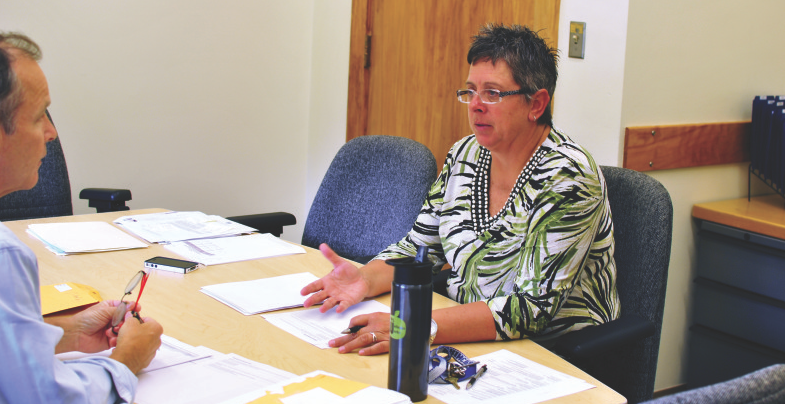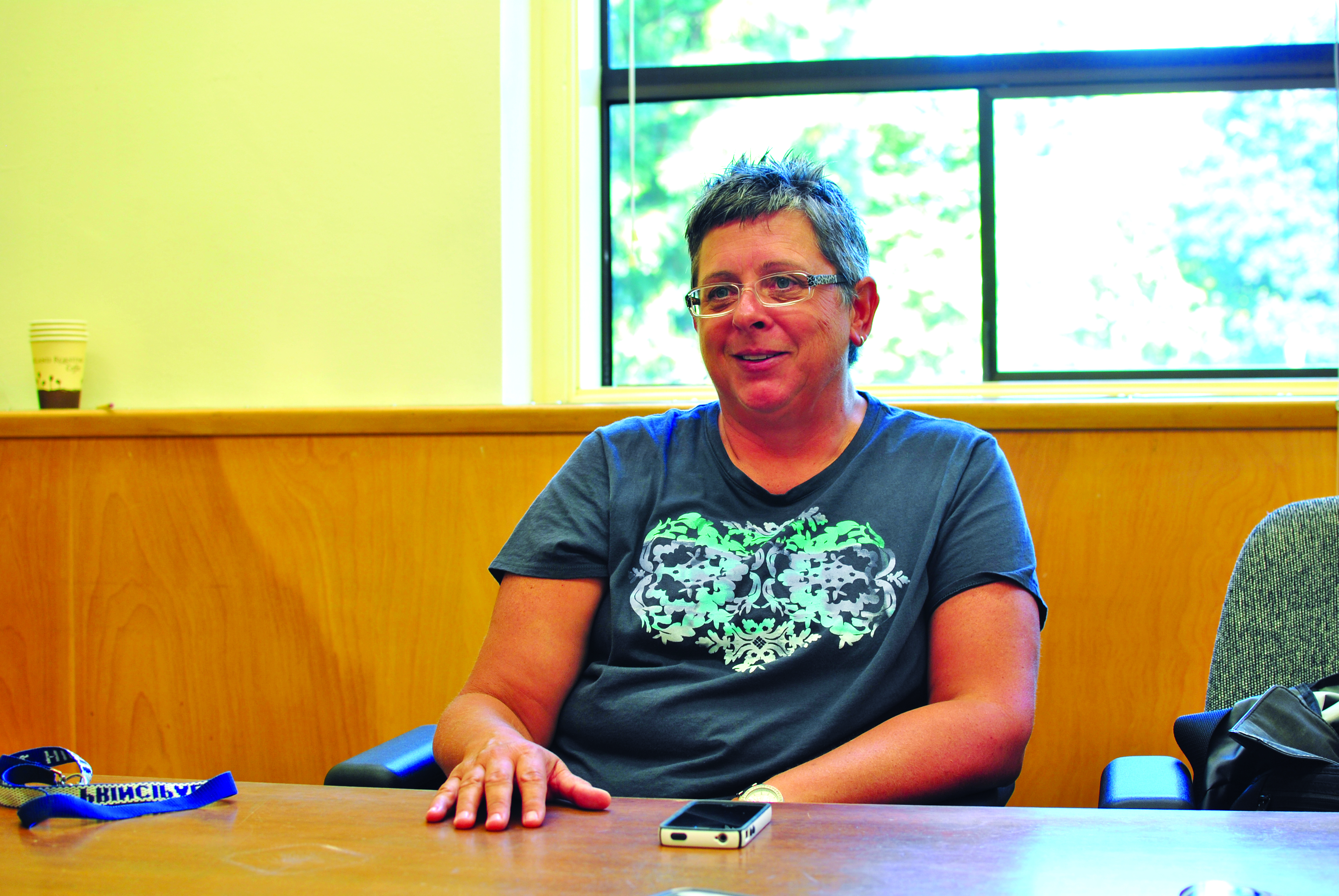
When she was principal of Benson High School, Carol Campbell’s day started at 4:45 a.m. Within minutes, she’d be out the door of her home in Newberg and on her way to a nearby 24 Hour Fitness. After 45 minutes on the treadmill, she would climb back in the car in time to arrive at the school by 7:30.
Campbell would greet students and chat up when she arrived. Time whirled past with meetings (her least favorite), classroom visits (her favorite) and paperwork – all part of a typical day at Benson.
She had taken over at the school two years earlier and had found a rhythm with things. She connected with the students and her relationships with teachers were friendly and collaborative. She expected to stay for a few years more.
But when Portland Public Schools Superintendent Carole Smith sought her out in late June and asked her to replace the change oriented and progressive Vivian Orlen, Campbell couldn’t say no.
“It’s a little bit of a homecoming.” – Carol Campbell
“I was a little shocked,” Campbell admits. “My first thought was, ‘It’s late in the year.’ It is really hard for me to leave Benson because I really like it and I’ve learned a ton. But it’s also exciting for me to think about going back to Grant because I do feel like I know a lot about the community and about the school.”
That’s because Campbell was a science teacher at Grant from 1998 to 2007. She had a reputation of working well with struggling students, jumping in to teach remedial classes. Every student comes from a different background, Campbell reasoned, and so every student learns differently – but they can all be achievers.
As the mother of two boys adopted from countries across the globe, Campbell is no stranger to diversity. Her own experiences as a gay woman growing up in a prejudiced town have also contributed to her belief in accepting differences. For Campbell, working with student differences is part of what makes education so interesting.
At Grant, Campbell faces one of the biggest challenges yet in her career. She’s now the principal of Portland Public Schools’ largest high school and she takes over in the wake of Orlen’s sometimes controversial three years. Orlen’s overhaul of Grant and its curriculum prompted both criticism and praise as she fought to narrow the achievement gap through major initiative shifts.
As Campbell takes the wheel, she faces rough waters in the future: potential retirements in an aging teaching force; continued curriculum changes; and massive school reconstruction in 2017 as part of the voter-approved school bond.
With Orlen’s departure for her native New York announced at the end of the last school year and Campbell’s position solidified less than three months ago, Campbell has been working hard to reconnect with the Grant community.
“It’s a little bit of a homecoming,” Campbell says of her return to Grant. “If I was going to a brand new school…I think it’d be a lot more stressful,” she says.
Still, Campbell says she hopes it won’t be awkward “transitioning from being a teacher colleague with people and now coming back into the building in a supervisory role.”
• • •
The oldest of four kids, Campbell was born as Carol Lee Nichols. She grew up in Troy, a small town in Missouri about an hour northwest of St. Louis.
When Campbell was a kid, Troy had a population of about 2,500. It was like any other small town. Whenever there was an athletic event, it attracted everyone. She spent her childhood hanging out with friends and riding her bike on the mile-long loop around town. “We could just go out and come home at dark,” she recalls.
Her parents were working-class locals. Her dad was a grocery warehouse worker, while her mom stayed home and took care of the kids. When Campbell’s youngest brother, Bobby, was born, her mom went to work in a factory.
That meant childcare duties fell to Campbell, who was 13 at the time. “She pretty much took me wherever she went and let me hang out with her,” Bobby Nichols remembers. “I was playing in the sandbox while she was playing softball.”
Though Campbell admits she sometimes resented the responsibility when she wanted to hang out with friends, Nichols remembers that his sister always made sure he was having fun.
His sister’s patience stands out in Nichols’ mind. When the family went on fishing day trips – the closest they ever got to a vacation – she was best at the waiting. Nichols also remembers her patience when she taught him how to throw a baseball. “Whether she was fishing or helping me with a project, she was a good teacher,” recalls Nichols.
In her free time, Campbell was always reading. She still owns the first book her grandmother gave her: the classic, Heidi, by Johanna Spyri. “I read a lot on my own thanks to her,” she says.
For years her grandmother lived as a farmer with a high school education, but she went to college when she was 50 and became a registered nurse. “I credit her in giving me that example,” says Campbell.
She thrived in school, but she was also a good athlete. In her sophomore year, she tried out for volleyball and made the varsity team. Volleyball was her outlet. She was team captain and was always the first to arrive at practice and the last to leave. Campbell emphasizes: “I was attracted to the team aspect of winning.”
It was volleyball that got Campbell a ticket out of her hometown. “My parents valued education but they didn’t really understand it beyond high school,” she recalls. “My parents were living in the town they’d grown up in.”
She didn’t want the same fate. In 1977, she entered Missouri Western State University on a volleyball scholarship. Her first impression was that the campus was huge. She was able to ease into the experience by arriving a week early to start volleyball, but she was still overwhelmed – the college had a larger population than Troy.
Suddenly, Campbell found herself alone in a large world. She missed her friends and family back home and struggled to balance her schedule. But the experience was positive from day one, she insists. “College opened up the world for me,” she says.
She loved everything about it: the independence, meeting new people, traveling for volleyball, and above all, the learning. She never missed a class.
College also helped her start to come to terms with her sexuality. “I knew from an early age that I was gay,” she says. But the people in her town, including her parents, made it clear that being gay was not OK.
“I didn’t even consider bringing it up, ever, to anyone,” she says. “Not my family, not my friends, no one.”
But at college she met other people who were gay. She realized she wasn’t alone. “It was kind of an awakening,” she says.
She decided to get a bachelor’s of science degree with a focus in biology, and it was clear to her that she wanted to teach. She took a year off after her sophomore year and transferred to the University of Missouri in St. Louis. She graduated in 1982 and looked for a teaching job while working at a YMCA.
• • •
Back home in Troy, she found herself once again in an “oppressive” environment. She didn’t want to risk losing family or friends by coming out. Campbell still felt unable to be herself.
So when she married a man named Jeff Campbell after dating for about a year, she says it was partly because it was “what my family expected me to do.”
“In that small town culture, that’s what everybody did,” she remembers. They’d met through coworkers and Campbell says they were good friends and happy together.
She found a teaching job at a private Catholic school in St. Charles, Missouri. For 14 years, she taught various science classes and coached the volleyball team. She became the athletic director and she started the school’s first health education program.
At home, she and her husband decided to start a family. “I wanted to have kids,” she remembers, and adoption seemed like the best option. She didn’t want to be a stay at home mom, so an infant was out of the question.
In 1988, they adopted a four-year-old boy from Taipei, Taiwan, and named him Chad. She remembers the day he arrived, sleeping in the arms of his adoption agency escort. He woke up and “was running around, pointing at things, talking, laughing,” Campbell says. When they took him home, he stood by the door of his room, flicking the lights on and off.
Life changed dramatically. Any down time they had was filled with taking care of Chad. She loved it. “It was really fun,” she recalls. Chad was eager to learn and was able to speak and understand English after a few of months.
Six years later, they adopted a seven-year-old boy from Bulgaria, naming him Corey.
Right from the beginning, things were different with Corey. Where Chad had been excited and easy to care for, Corey was more afraid after his experiences in the Bulgarian warehouse-like orphanages. He had never gone to school or held a pencil, Campbell recalls. “He had a lot of catching up to do,” she says.
Corey had trouble learning to color or write the alphabet – difficulties initially chalked up to culture shock and a language barrier. It took a couple years to realize that Corey had learning disabilities, but he made strides in his learning once placed in a special education class.
“I think having a child with special needs definitely increased my awareness of the challenges students and families face in the school system,” she says now.
When Campbell finally came out to her family in her late thirties, she remembers it went better than she’d expected. Her dad had already passed away, but Campbell says her siblings and mom were totally accepting of the news. “They don’t talk about it but they’ve been great,” she says with a laugh.
“I felt like I’d found my purpose.” – Carol Campbell
In 1997, Campbell and her husband agreed to split up. She says the problem wasn’t just her hidden sexuality. “There were lots of things about us that were different,” she explains. “It was a turning point for me to live my life the way I wanted.”
In 1998, Campbell and her kids moved to Portland and she took a job teaching freshman biology at Grant. Toni Hunter, the principal at the time, had interviewed Campbell over the phone. “I could tell in the interview how much she cared about kids,” Hunter recalls.
For Campbell, Grant was a very new experience. It was three times the size of her old school and the variety of students was staggering. “It was a really different kind of teaching environment,” she remembers. “Grant was pretty diverse for me.”
Campbell fell in love with the school. “I felt like I’d found my purpose,” she says, thinking back to her first days. Her students came from all over the city and many different backgrounds, with varying needs in the classroom. Campbell rose to the challenge.
“I felt like I finally had found what I wanted to do and a place where I really wanted to work and the kinds of students who I really wanted to work with,” she says. “I like the problem-solving piece, the challenge piece of providing instruction that meets the need of a variety of students.”
At the time, the school focused more on its advanced students than on its struggling students, says Therese Cooper, who has been teaching English at Grant for 16 years.
Campbell assisted Cooper in coaching the volleyball team for several years, then took over as head coach when Cooper stepped down. Campbell also coached women’s basketball and track. “She cared a lot about her kids,” Cooper recalls. “She was driven to try to teach them to succeed.”
Margaret Calvert, current principal of Jefferson High School, was a math teacher at Grant at this time. She remembers Campbell’s empowering coaching style.
Campbell involved her athletes in discussions about practices and game strategies, Calvert says. “Her players as a result felt that they had a voice,” Calvert recalls, “and it was their team.”
In addition to biology, Campbell taught special science classes for students who hadn’t passed their requirements in middle school. “They really were capable of doing regular science,” she remembers noticing, but these lower-achieving students had been assigned to classes with lower expectations, starting them off on the wrong track, she says.
She worked with Grant’s vice principal at the time to change it. Their goal was to “have the instruction changed to accommodate whatever supports students needed to be successful in that rigorous, high expectation class,” Campbell says.
Campbell’s drive for improving instruction eventually developed into an interest in administration. She began to realize leading a school would mean a chance to have a bigger impact on students’ education.
She seemed fit for the role. Hunter recalls Campbell’s thoughtfulness and careful consideration when issues arose. “If we were in staff meetings and Carol would speak, people would listen,” she says.
• • •
She got her administrative license and left Grant in 2007 to lead a small high school in Newberg. The job was a unique opportunity. Newberg High School was splitting into four smaller schools that shared a campus and elective classes, but each school had its own principal. Campbell saw it as a chance to learn and grow. She was in charge of 400 students and 25 teachers.
As principal, Campbell ran her school’s leadership class. Every time there was a decision to be made, the students were included. “I really like that part of my job. I would not like this job if I had to work in isolation and just be someone who didn’t get to talk with people and get ideas from other people,” says Campbell.
In 2011, she left Newberg to take the lead job at Benson. Back in Portland, she describes Benson as “a great opportunity for me because I’ve been able to go even deeper into that career technical ed.”
Her goal at Benson has been to help students succeed by providing educational opportunities to fit many different interests and careers.
While at a district event in June, Campbell ran into Smith, the superintendent. After talking for a few minutes, Smith surprised Campbell by asking her to consider being the principal of Grant. She was torn. She had really enjoyed working at Benson, but the chance to return to Grant in a different role was intriguing. It took her a day to say yes.
Smith says Campbell “immediately came to mind” when Grant was suddenly in need of a new leader. She notes that both Campbell and Orlen are “really high expectation people,” and adds that Campbell is “really passionate about being a principal and building relationships.”
Orlen liked what she saw of Campbell when they met as colleagues. “Carol is one of those…who didn’t speak often but when she spoke I always listened,” she recalls.
“She’s a huge advocate for students.” -Vivian Orlen, former Grant principal
Being accessible is one of the biggest expectations of a Grant principal, says Orlen. Campbell “clearly really enjoys teenagers” and is “rock steady,” so Orlen feels the school is in good hands.
Campbell already has connections with the Grant community from her years as a science teacher, and she already has experience with the school. However, she says there’s a lot for her to learn. “Things have changed since I was there in ‘07,” she explains, “and I want to get back up to speed on what’s going on there now. I don’t think that it would be a good idea for me to just start making changes and making decisions about how things are going to be in there without taking the time to really get back into the community.”
She is passionate about helping teachers grow their skills; her doctorate, almost finished, focuses on teacher professional development. “Teacher professional development is often one-shot, one day workshops and there’s never any follow-up,” Campbell points out, suggesting that a more helpful approach would involve teachers working with each other.
“I know that I was doing my best teaching my last year,” she says. “Every year was an opportunity to learn something different and watch other teachers try different things.”
• • •
One of the bigger upcoming challenges for Campbell will be leading the school through the bond that promises to renovate Grant, among other PPS schools. Planning begins in 2015, and Campbell says the district will need to anticipate the school’s future needs to effectively complete the renovation.
She will also have to navigate the issue of where Grant students will go for the two years Grant is under construction.
Course offerings are another big issue: the debate between AP and support classes has raged on at Grant for years. In Campbell’s eyes, every student is capable of taking challenging classes. Her hope is to improve the rigor and instruction in regular classes to encourage students to try AP classes – but she also recognizes that some students need more support in their regular classes.
With so many problems to juggle, sometimes the life of a principal gets to be too much. To escape stress, Campbell still enjoys going fishing. She loves the feeling when she stands knee deep in calm water, surrounded by nature and out of cell-phone range. Sometimes she watches deer come down to the water. “It doesn’t really matter if you catch anything or not,” Campbell says. “It’s the whole experience.”
Her sons, both long since graduated from Grant, still live close to home. Corey, 25, lives mostly independently in Portland but gets help with job training and managing of his finances. Chad, 29, works for Leatherman Tool Group and lives in Parkrose with his girlfriend. They are expecting a baby boy any day now.
Campbell expects her weekends to be filled by spending time with her grandchild. Most evenings at home, she relaxes in a living room recliner while her two beagles cuddle in her lap. Sometimes she works on her doctorate or catches up on email.
At school, she welcomes feedback. She wants to know how students and teachers feel she is doing at her job. She’s told principal secretary Angie Payne: “If there’s a student who wants to meet with me, I want to meet with them.”
Cooper says one of Campbell’s best attributes is her ability to build coalitions. “I see her as somebody who can definitely bring people together,” she says.
Campbell is eager to get started at Grant and to welcome students. “At this time of the year, I’m ready to go back to work,” Campbell says. “I really do love the work and love the job.” ♦





